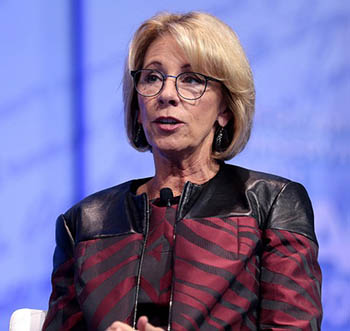
President Donald Trump’s appointment of Betsy Devos as the United States Secretary of Education was confirmed by the US Senate in February 2017. I would like to briefly provide some context for making sense of the Devos appointment.

Devos’ nomination was met with consternation and surprise across the political spectrum. Like several other appointees Devos is a billionaire, as a result of inheriting and marrying fortunes. Her brother is Erik Prince, billionaire heir and founder of Blackwater, the notorious mercenary corporation.
A twenty-year veteran of political lobbying for public school privatization, particularly for-profit charter schools and vouchers, Devos comes to the position without a record of working in public administration or public education. Like many of Trump’s other nominations such as Scott Pruitt for EPA, Jeff Sessions for Attorney General, or Rick Perry for Energy, the nominees appear most suited to undermine the respective agency in its mission.
Davos fits a pattern of an administration intent to erode federal government regulatory authority and to withdraw federal support for care-giving and protective government roles. As a lobbyist for charter schools and school vouchers, Devos’ career represents a commitment to undermine public education and to contribute to building a privatized industry in education that also has a much greater role for public funding of religious education. She is expected to lead the effort to cut Title I money designated to support public schools in working class and poor communities and shift it to private for-profit schools paid for by vouchers.
The Devos appointment represents a furthering of the longstanding rightist project to replace public education with a privatized industry in education. Public school privatization has been promoted by Republicans but also by the right-wing of the democratic party. As I have been arguing for nearly twenty years, the privatization of public schools is part of a broader neoliberal remaking of public institutions. Public school privatization includes charter schooling, vouchers, scholarship tax credits that function like vouchers, commercialism, for-profit media and curriculum ventures, online cyber schooling. As well, the broader neoliberal remaking of public education expands the ideologies of corporate culture, managerialism, and consumerism in public schools. The long-term vision of Devos is consistent with the perspectives of both for-profit education profiteers and supranational organizations such as the World Bank that represent the strategic and financial interests of transnational corporations and a transnational capitalist class.
Right wing think tanks and academics in the U.S. have begun imagining not just the transformation of public education into a private industry, but the separation of the services that a school provides and the privatization of each one. The aim is to end the very idea of the public school as a place that children attend, and instead promote the idea of education as distinct, private and for-profit, services.
As I have recently discussed in my book Scripted Bodies, the expansion of for-profit curriculum and technologies in schools not only promotes a standardized and anti-intellectual school culture but it fosters the expansion of repressive control over the body. That is, privatization and commercialism promoted by Devos accords with both the turn towards a culture of repressive control in schools and the broader rise of political authoritarianism while denying students the intellectual tools to comprehend and confront it.
Perhaps what is most disturbing about Devos’ view is that it presumes that the role of public education is nothing other than to make workers and consumers. It has no place for the traditional role of public education in preparing citizens who have the knowledge, skills, and dispositions for self-governance. The Trump agenda of gutting care-giving public institutions, attacking the news media, rolling back voter rights protections, are consistent with the aim of dismantling and selling off public education as a vital part of the democratic public sphere.
The Devos appointment also represents something that is newer and also quite ominous. Namely, a radical disregard for evidence, argument, knowledge, and education itself.
Devos remains committed to expanding vouchers and for-profit charter schooling even as overwhelming empirical evidence from multiple states and countries show that these policies worsen schools and lower test scores. The record of failure for privatization includes Devos’ own activities in Michigan. As Devos’ nomination moved forward, additional statements and actions raised questions as to her commitment to truth, fact, and evidence. These ranged from defending guns in schools to protect against grizzly bears, to her investments in a sham brain treatment center that shows children with autism and ADHD movies and interrupts them when they stop paying attention. While getting more guns in schools does not make schools safer and guns appear not to be the best defense against the scourge of grizzlies (pepper spray does work), there is no empirical evidence either for the movie based brain treatments.
Devos enters an educational scene structured by an overwhelming contradiction. On the one hand the dominant rhetoric of the field demands “data driven” teaching, leadership, and policy with an inflated emphasis on numerically quantifiable test-based “accountability.” Such approaches to teaching and fetish for measurement represent a mistaken emphasis on decontextualized learning in which knowledge is treated as units of commodity to be delivered. Such an approach is opposed to ones that make learning meaningful to make it socially transformative. In practice Devos typifies not an embrace of evidence for policies and practice but rather an embrace of a fanatical faith in market based educational reforms.
The biggest beneficiaries of the Devos agenda will be for-profit educational companies and the predominantly rich white people who own them. The biggest losers will be predominantly poor and non-white people who deserve a commitment to reverse the historical disinvestment in their public schools not a new round of disinvestment and pillage.